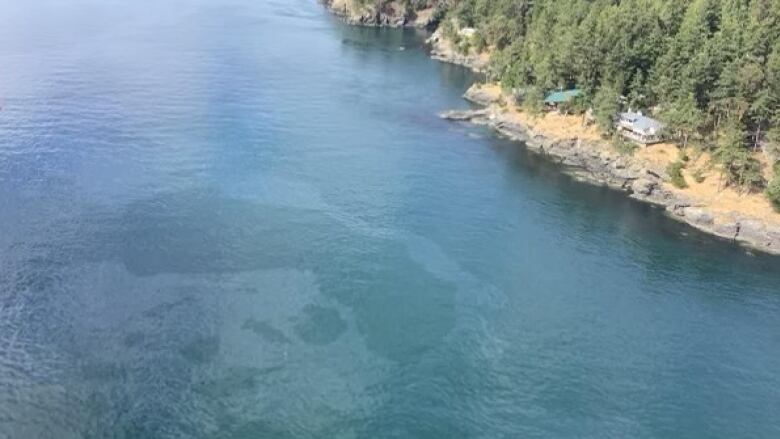Oil spill off San Juan Island 'pretty well impossible to clean up,' expert says
Fishing boat had nearly 9,840 litres of oil and diesel on board when it went down in Salish Sea

Crews are assessing the waters off San Juan Island in the Salish Sea near Vancouver Island after a fishing boat sank and leaked fuel on Saturday.
The Aleutian Islehad nearly 9,840 litres of oil and diesel on board when it went down off the west coast of San Juan Island in Washington state.
Gerald Graham, a Victoria-based consultant who specializes in marine oil spill response and prevention, said the diesel fuel flowing from the boat is very light,which means crews can't use booms or skimmers to clean it up.
"It's pretty well impossible to clean up," he told The Early Edition host Stephen Quinn.
"In the open water, there's virtually nothing you can do because the oil would either splash over a boom or go under it."
He said the best thing to do would be to try to stem the leak and siphon the remaining oil off the wreck.
Although the spill is technically in U.S. waters, there is potential for it to move into Canada, which means both U.S. and Canadian coast guards are responding. The two groups train together to prepare for such situations.
The Canadian Coast Guard says it will be conducting assessments from the air and on the water Monday to determine the extent the leak has spread. As of Monday morning, no Canadian shorelines had been affected.
On Sunday, a release from the U.S. Coast Guard (USCG) said divers would try to reach the sunken Aleutian Isle on Monday to better assess its condition, plug its vents and begin removing fuel from the vessel.
USCG Petty Officer Michael Clark said investigations are underway to determine whether the boat and its crew were disobeying laws regarding water pollution. If they are found liable, said Clark, they could be fined.
#MorningUpdate - Unified Command crews continued monitoring the spill throughout the evening. A Coast Guard operated drone is planning to launch later this morning to collect additional imagery. As a reminder there is a 1,000 yard safety zone around all responding dive boats. pic.twitter.com/0mc5d3bLcX
—@USCGPacificNWRisk to marine life
Graham said orcas were spotted in the area on Saturday afternoonbut they turned around and went west up the Strait of Juan de Fucabetween Vancouver Island and Washington's Olympic Peninsulawhich he said "is not typical for them."
"They usually make a beeline for Haro Strait [between Vancouver Island and San Juan Island] and go up the west coast of San Juan Island, hugging the coast. This time they turned around, so it is extremely fortunate," Graham said.
But he worries killer whales might return to the area. Oil spills can cause skin irritations in orcasand the vapours are toxic.
"We'll keep an eye out for them," he said.
Peter Ross, a senior scientist with Raincoast Conservation Foundation, said the spill happened in the "worst place of all" for southern resident killer whales, in the middle of "critical" habitat.
The area is protected under the U.S. Endangered Species Act, he said, because it's a popular fishing spot for the orcas. Chinook salmon, the whales' main prey and a species facing its own survival challenges, swim along bluffs on San Juan Island, creating a feeding channel for the orcas, he said.
There are only 74 southern resident killer whales remaining and the federal government says the main threats to the species are contaminants, declining chinook populations and acoustic disturbances.
The U.S. Coast Guard said Monday the whales were last spotted west of Port Angeles, at least 50 kilometres from the spill site, but Ross said that's not more than a day's journey for the orcas.
Seals, sea lions, fish and marine birds are also at risk from oil spills.
According to a tweet from the USCG, any sightings of animals with oil on them can be reported tothe Washington Department of Fish and Wildlifeat 1-800-22-BIRDS.
With files from The Early Edition, Amy Smart and The Canadian Press












_(720p).jpg)


 OFFICIAL HD MUSIC VIDEO.jpg)
.jpg)



























































































